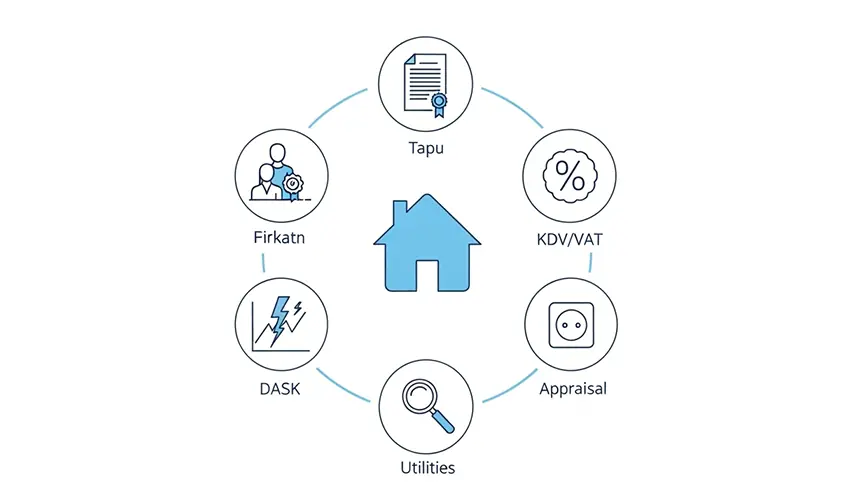Purchasing property in Turkey is an exceptional investment opportunity. However, hidden and additional costs can significantly impact your total spending. From title deed taxes and legal registration fees to real estate agency commissions, mandatory insurance like earthquake insurance (DASK), and even utility connection charges, each of these elements requires careful planning and attention.
Being aware of these costs—and how to reduce them—helps you navigate the Turkish real estate market with confidence and avoid unexpected expenses. In this guide from Esta Property, we’ll walk you through the essential hidden costs and offer smart strategies to minimize them for a smooth and cost-effective property purchase.
Hidden Costs of Buying Property in Turkey
Buying property in Turkey involves more than just paying the purchase price. Numerous additional expenses must be considered to budget effectively.
1. Title Deed Transfer Fee (Tapu Harcı)
One of the most significant hidden costs is the title deed transfer tax, paid to the General Directorate of Land Registry and Cadastre (Tapu ve Kadastro). This fee amounts to 4% of the official property value and is typically shared between buyer and seller. However, it may be negotiated differently, especially for second-hand properties where the buyer often bears the full amount.
2. Value Added Tax (KDV)
VAT in Turkey varies depending on the type and location of the property. While some residential properties are taxed at just 1%, others—especially commercial or luxury properties—can have a VAT rate between 10% to 20%. This tax is usually paid by the buyer.
3. Property Appraisal Report & Translator Fees

Foreign buyers must obtain a property appraisal report (Expertiz), which verifies the market value of the property. This report costs between $250 to $600. If you're not fluent in Turkish, you'll also need to hire a sworn translator for the official deed signing, which incurs additional charges.
4. Earthquake Insurance (DASK)
DASK is a mandatory earthquake insurance required for all properties in Turkey. Although relatively inexpensive, it is compulsory. The cost ranges from $100 to $300 annually, depending on the property's size and location.
5. Utility Meter Installation & Subscription Fees
If you're buying a new or unoccupied property, you'll need to install water, electricity, and gas meters—costing between $200 to $500 on average. For second-hand properties, you’ll only need to transfer existing subscriptions, which is much cheaper.
6. Real Estate Agent Commission
Real estate agents typically charge a commission of 3% to 5% of the property's value. This is often split between buyer and seller, but may vary depending on the agreement. It is essential to clarify the commission terms in advance to avoid surprises.
Key Strategies to Reduce Property Purchase Costs in Turkey

Buying property in Turkey can be a financially wise decision, but reducing additional costs can make it even more beneficial. Here are smart strategies to minimize your expenses:
1. Compare Property Prices
Evaluate multiple listings to understand fair market values and avoid overpriced properties.
2. Negotiate with the Seller
Always negotiate for a better deal—be it a price reduction or shared responsibility for additional costs.
3. Lower Agent Commissions
Some agents are flexible with their commission rates. Don’t hesitate to ask for a discount, especially if you're making a significant purchase.
4. Benefit from Tax Exemptions
Certain properties may be eligible for tax exemptions or reduced VAT. Consulting a tax advisor can help you identify such opportunities.
5. Choose Properties with True Market Value
Avoid overvalued properties marketed through hype. Focus on real value based on location, infrastructure, and development potential.
6. Reassess the Deed Transfer Cost
Discuss with the seller whether the 4% Tapu fee can be split or even covered entirely by them as part of the negotiation.
7. Avoid Unnecessary or Hidden Fees
Be cautious of hidden service charges from intermediaries. Make sure all costs are itemized and agreed upon in writing before proceeding.
8. Work with Reputable Real Estate Agents
Professional agents provide transparent pricing and help you avoid pitfalls, saving money in the long run.
9. Buy Directly from Developers
In some cases, purchasing directly from the builder can reduce intermediary fees and provide discounts or flexible payment plans.
10. Analyze All Associated Costs
Carefully review every potential fee—taxes, insurance, utilities, and legal expenses—to build a comprehensive and accurate budget.
Buying property in Turkey is a rewarding investment, but success lies in planning. By understanding and accounting for all hidden and side costs, you can approach your purchase with confidence. Smart negotiation, thorough comparison, and choosing the right professionals will ensure a smooth and cost-effective experience in Turkey’s dynamic property market.
Final Words on Buying Property in Turkey
Purchasing property in Turkey comes with more than just the property price. Several additional costs should be taken into account to avoid surprises during the buying process. These include:
- Title deed transfer tax (Tapu)
- Legal and consultancy fees
- Compulsory earthquake insurance (DASK)
- Real estate agent’s commission
Being aware of these expenses and planning accordingly can protect you from unexpected costs. To make a smart and cost-effective investment, consider the following tips:
- Compare property prices across different areas or listings
- Negotiate with sellers where possible
- Work with professional consultants to ensure a secure transaction

At Ista Property, our team of experts is here to guide you through every step of the property buying process in Turkey. We ensure full transparency and help you minimize costs while navigating all legal and administrative procedures.
If you're looking for a safe investment and stress-free property purchase in Turkey, our professionals are ready to support you.
Frequently Asked Questions
How is VAT (KDV) calculated on property purchases in Turkey?
Here’s a basic breakdown:
- 1% VAT is typically applied to residential properties under 150 m²
- 8% or 18% VAT may apply to commercial properties or larger units
- Resale properties (from individuals) are usually exempt from VAT
- The payment is made in foreign currency
- The buyer doesn’t hold Turkish residency at the time of purchase
What are the usual legal and consultancy costs?
- Lawyer’s fee: Around $1,000 – $1,500 (varies by complexity)
- Consultancy service fee: Typically 2% – 3% of the property value
- Legal checks on the property (ownership, debts, zoning)
- Drafting and reviewing contracts
- Assistance with documentation and residency applications (if needed)
Is earthquake insurance mandatory in Turkey?
- It is mandatory for registering the title deed
- It is also needed to activate utilities (electricity, water, gas)
- The size and location of the property
- The region's earthquake risk level

 USD
USD
 TRY
TRY
 EUR
EUR
 IRR
IRR
 RUB
RUB

Comments